The weather in Antarctica is not what you would call “pleasant”. To some, it may not even qualify as dreadful. Barely any sun sneaks through the overcast skies, and what little does somehow seems disingenuous, often glimpsed flirting with a far-off mountain or dancing with distant horizons. The winds can become awfully disagreeable, whipping the sea into stiff peaks, and if the stories are true, occasionally hurling seabirds violently into the hull of passing ships. One can argue that it adds just the right amount of atmosphere to the expedition. It is Antarctica, after all.
Truth be told, it is not really as bad you might think. Despite mountains full of purported evidence, Antarctica rarely sees fresh snow. Though it seems hard to believe, the continent sports a desert climate with very little precipitation. Yet the snow and ice is literally hundreds of feet thick. How can this be? It turns out that snow has been accumulating at a rate of only a few hundred millimeters per year.
It is just that it never melts. In other words, exactly the opposite of what happened to Michael Jackson’s face over the course of his career.
Strangely, it is not all that cold. Despite our long-johns, turtlenecks, fleece sweaters, down parkas, wool caps, ski gloves, scarves and thermal crotch warmers, the temperature was generally in the mid-thirties during the day. That’s right,
you had worse weather back home.While it’s true that the center of the continent can see extremely severe weather, the shoreline is actually quite nice.
There was only one day when the weather prevented us from following our itinerary. The wind picked up, the seas became rough, lunch became tenuous, and we could not risk embarking on the small Zodiacs that ferried us from our vessel to shore. But backup plans are de rigueur on these voyages, and we instead navigated into a protective cove to explore an old British base called Port Lockroy, now a museum, which is currently manned by three attractive, young women. According to the brochure “Port Lockroy is one of
Antarctica’s most historic locations and a highlight of any voyage to the frozen continent”. Presumably this is due to the fact that
Antarctica is generally uninhabited, and, hey,
three attractive young women living alone on an Antarctic island.
The base was originally built during WWII to spy on the Germans, but was abandoned when the British realized that even the German’s weren’t stupid enough to send their boats through the
Drake Passage. The base has been fully restored and now houses a small museum, as well as a gift shop. Because, really, who can stomach an entire trip to the most remote place on earth without getting in a little shopping? The women run the shop, post mail, study the local penguin population, and, I imagine, have topless snowball fights with each other when no one else is around.
It was a great stop, and an interesting slice of history. And anyone can volunteer for the summer shift. Four months of island living, and all the penguins you can eat. It turns out that not too many men sign up. Seems like a
missed opportunity to me. Maybe I'll volunteer next year.




